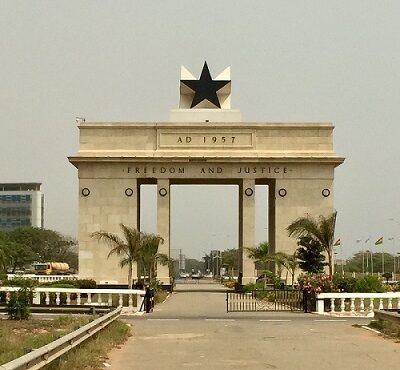A dilemma called Ghana (Part 3)

The Independence Arch
In response to the first two parts of the above heading, a young banker sent me an email expressing amazement at the narratives because he did not live through the periods and heard very scanty accounts. He was sure he did not glean much from history textbooks.
I am encouraged by such responses because, having read many books on our country’s history, I came to the sad realization that many of the authors were influenced by their political, economic, or emotional biases. Historical narratives must be devoid of these.
I recall that when I stated factually that it was not Tetteh Quarshie who introduced cocoa to this country, I was almost taken to the cleaners by some people who claimed to be descendants of Tetteh Quarshie until I referred them to the evidence. But I have always given credit to Tetteh Quarshie for the variety he brought from Fernando Po, which was bigger and contained more beans than the smaller, elongated variety in the Gold Coast at the time.
Now, General Acheampong’s UNIGOV idea was shelved with a palace coup led by General F. W. K. Akuffo, a member of the governing SMC, that kicked him out and banished him to a forlorn enclave at Asuogyaman.
General Akuffo laid out plans for a return to constitutional democracy. A new constitution was drafted, and Ghanaians looked eagerly forward to electing their own rulers.
But there was a blot on the image of our soldiers. Having tasted power, many of them became more corrupt than the civilians, issuing out cheats for essential commodities to their favourites and lackeys.
But the citizens were just fed up with the men in uniform and were biding their time for them to head back to their barracks. It was a moment in our history when respect for soldiers hit a low point. Even military uniforms were being sold in the markets. Women could openly insult the men in uniform.
Then, just a few months before the general elections, on May 15, 1979, there was an attempt to overthrow the SMC junta. Political parties were campaigning in earnest. My sympathy was for the Action Congress Party (ACP), led by Colonel Frank George Bernasco. I simply loved and respected Bernasco.
The next edition of the Daily Graphic had a picture of a certain Flt. Lt. J. J. Rawlings, who was responsible for the coup attempt. When I saw the picture, I quickly remembered that I had seen him at the Officers Mess in Accra when I went to visit a senior who was himself a military officer. I saw the lanky, almost Caucasian figure sitting at a table with dark glasses that I thought were too large for his face.
He had crossed his legs on the table and used the cutlery as drumsticks, tapping on the edge of the table. He was in mufti, so I asked my host if children of diplomats had access to their Mess. His response in a low tone was, “That guy is a Flying Officer. Won the Speedbird trophy in airmanship. He’s called Rawlings.”
The public’s reaction was mixed. What in the devil’s name was this airman up to? The nation had had more than enough of these soldiers. The soldiers wanted to perpetuate themselves in power. What was going to happen with the elections around the corner? There were too many unanswered questions. Foreign media were in a frenzy in their condemnation of the attempt to derail the march to constitutional democracy.
Rawlings and a handful of soldiers were arrested and put on trial. He admitted being solely responsible and asked the military tribunal to set his men free. I think it was by divine providence that the trial was open to the public because Rawlings spoke about what was eating the other ranks up inside.
It was on the day Rawlings and his men were going to be sentenced to death that some junior officers went to free him from the cells of the Bureau of National Investigations (BNI), and so was the launch of what came to be known as the June 4 Uprising. An Armed Forces Revolutionary Council (AFRC) was to replace the SMC.
A housecleaning exercise was launched to cleanse the rot within the Armed Forces. According to Rawlings, there was a need to go back to the barracks on a clean slate. Some former military heads of state and a few other senior members of the SMC were put to the stakes and executed by firing squad. This marked a rather harrowing epoch in our nation’s history.
Students from all walks of life took to the streets in support of the Revolution and chanted, “Let the blood flow.” Women traders who were caught selling above reasonable prices were, in some cases, stripped and whipped by overzealous revolutionaries. Makola Number One market, suspected to be a citadel of profiteering by market women, was razed to the ground. It became known as Rawlings Park, albeit unofficially.
I have devoted this write-up to the June 4 era because last Sunday was exactly 44 years since that event. Ghanaians braced themselves to endure the excesses of the moment in the hope that the elections, which the AFRC guaranteed would take place so that they could get on with their civil lives.
The AFRC set up tribunals that handed down outrageously long prison terms to some operatives of the SMC, mainly senior military officers. These trials were not held in public, though. Businessmen who were suspected of profiteering were picked up by soldiers and taken to Gondar Barracks and “drilled” military-style.
But one thing that caught my interest was what Rawlings said at his trial. He said something to the effect that the ordinary Ghanaian could hardly afford a decent meal while the senior officers were living well, and also that the military was going back to the barracks with a dent on their image. This was what resonated with the other ranks, students, and anyone with a conscience for justice.
When I asked Rawlings later where he got the courage to make such a statement, he told me, “Chief, I was terrified of the consequences of my action on May 15 after my arrest. I knew I was going to get shot after the trial. Gbɔ kuku mevɔna hɛo, so I had nothing to lose. If that happened, Ghanaians would remember me for seeking justice for the downtrodden.”
Translated, the Ewe he spoke means that a dead goat fears no knife. Since he was sure to face the firing squad, he did not need to hold anything back.
As events unfolded, Rawlings carried a nation that needed redemption along with the Revolution. Ghanaians called him “Junior Jesus” and latched onto everything he said. If there were dissenters, they did not openly express themselves, perhaps for fear of being picked up.
True to its words, the AFRC allowed the general elections to go ahead. For the second time, I voted in a general election; of course, for Bernasco and his Action Congress Party (ACP). I was, however, amazed that the ACP won all ten constituencies in the Central Region and none in any other regions.
The People’s National Party (PNP), led by Dr. Hilla Limman, won the elections, and he was eventually sworn in as President.
Rawlings and his men retired to join their units in the Armed Forces. At the handover, Rawlings told the new president that Ghana was looking up to him to deliver and that they were going back to the barracks with the humility with which they came to power.
The first major action of President Limman was to retire Rawlings and members of the AFRC, and their known operatives. The death knell of the PNP administration was thus sounded. The excuse of the government was that, as a former head of state, Rawlings could not be in a subservient position. Rawlings rejected a hundred thousand-dollar offer to go and study abroad as his retirement package, which to him would have been a sellout.
Perhaps due to the revolution, Rawlings was seen as a threat to the Limman administration, so the Military Intelligence (MI) was tasked with keeping Rawlings and Captain Kojo Tsikata in their sights.
Kojo Tsikata was blatantly trailed, and when he eventually swerved them, the MI boss, Col. Annor Odjija, was reported to have told Limman that once they lost Tsikata, his government was in trouble.
When Odjija fled to Togo, Kojo Tsikata was leaving Lome for Accra when 31st December happened.
Writer’s email address:
akofa45@yahoo.com
By Dr. Akofa K. Segbefia













